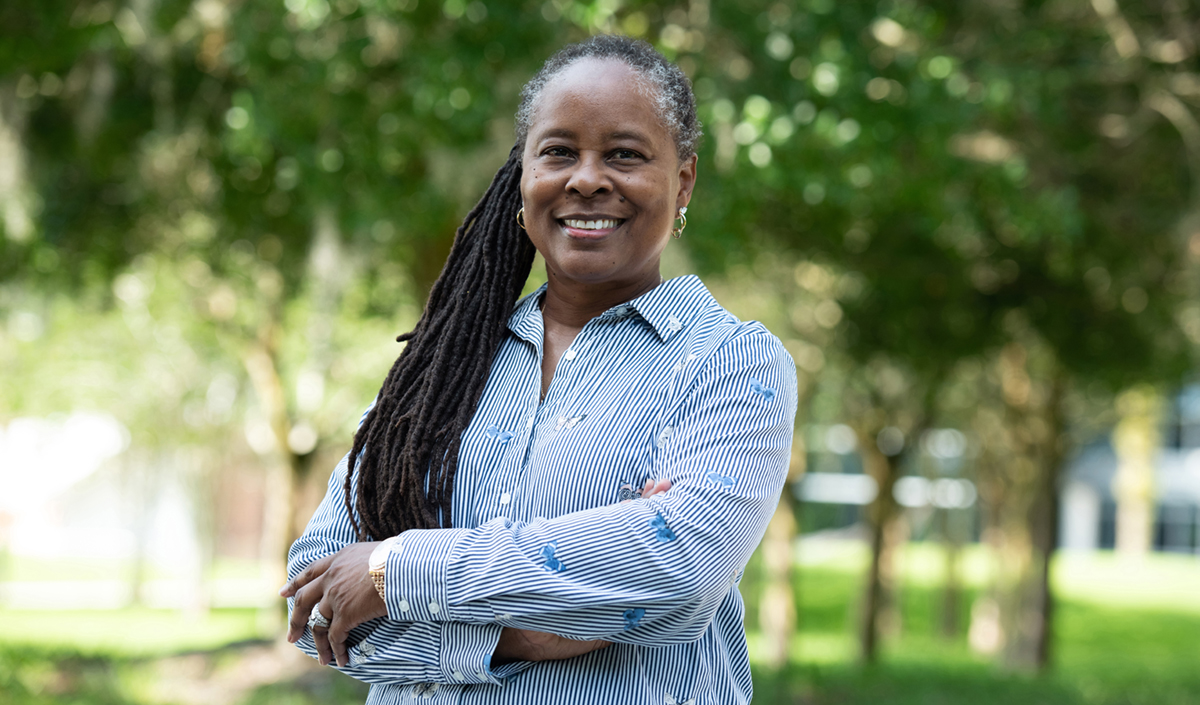Professor Janice Seabrooks-Blackmore and her team work with postsecondary institutions across the state to develop accessible and inclusive programs for students with intellectual disabilities.

As early as 10 years old, Janice Seabrooks-Blackmore remembers teaching children in the neighborhood on her father's back porch, especially those children who didn't learn in the same way as others. “It wasn't called special education back then, but even without that language, I was always intrigued with diverse ways of learning,” says the professor of exceptional student education. "I like the challenge of figuring out various perspectives, of how people see things, how to bring a point to clarity or understanding in different ways than are typically presented."
Today, Seabrooks-Blackmore is the director of the UCF Florida Center for Students with Unique Abilities, which is responsible for supporting Florida postsecondary institutions to build accessible and inclusive programs for individuals with intellectual disabilities.
Seabrooks-Blackmore came to the center with more than 40 years of experience in education working with students, families and colleagues in public schools and higher education in support of children and young adults with disabilities.
Her career began as a special education teacher. After a decade in the classroom, she broadened her knowledge and skills and became a middle school counselor. Then in 1995, she received her doctoral degree from Florida State University in special education with specializations in community transition and specific learning disabilities. Since that time, much of her research, teaching and leadership has focused on transition-related issues, addressing the needs of students with disabilities transitioning from high school to postsecondary education.
In addition to her work in leadership, teaching and research for special education and educational leadership programs in Florida, Texas and Georgia, she has developed strategic learning strategies for programs supporting children and young adults with disabilities. In her most recent position before joining UCF, she was chair of the Department of Exceptional, Deaf and Interpreter Education at the University of North Florida in Jacksonville.
Much of Seabrooks-Blackmore's work, in addition to teacher preparation, involved working with states to find ways to help districts improve outcomes for people with disabilities transitioning to employment, postsecondary education or independent living. With decades of research focused on youth transitioning into adulthood and evidence-based learning strategies that support and empower these individuals, her role at the center was a natural next step.
Support for the center began in 2016, when the Florida legislature established the Florida Postsecondary Comprehensive Transition Program Act. The act aimed to increase independent living, inclusive and experiential postsecondary education, and employment opportunities for Florida students with intellectual disabilities. As a result, UCF established the center, which provides support to students, families and institutions of higher education, so students with intellectual disabilities can have on-campus college experiences that lead to employment opportunities.
Once a program at an institution is approved by the center and by state standards, eligible students with disabilities are awarded a $7,000 scholarship. In addition, approved institutions can apply for a $300,000 grant each year to develop more inclusive support, including peer mentors, coaches, assistive technology and other resources.
According to Seabrooks-Blackmore, completion of an approved program has led to various career options and credentials for students — hospitality, welding, construction, early childhood, security, automotive repair, healthcare, agriculture, horticulture, scuba diving, first aid, technology, animal behavior and training, the culinary field and more.
“We are learning so much more about the abilities of individuals with intellectual disabilities, like what they are capable of. We have been so limited in our perspective.”
In addition to inclusive classrooms where students with intellectual disabilities learn alongside their peers in the same courses, most programs also offer work-related experiences, internships or volunteer opportunities.
According to Seabrooks-Blackmore, retention over the last three years, even during a pandemic, has been excellent. She also says as of last year, 107 students completed the program, and of the 158 enrolled students, 88% met satisfactory academic progress. Not only that, by graduation, most students have identified an employer or are already employed.
We are learning so much more about the abilities of individuals with intellectual disabilities, like what they are capable of. We have been so limited in our perspective.
Janice Seabrooks-Blackmore
With 19 programs on 24 campuses, Seabrooks-Blackmore says the center’s goal is to expand that number to the 120 eligible institutions across the state of Florida.
She says every postsecondary institution is unique, as is each student. "The more programs approved throughout the state, the more students with intellectual disabilities will gain meaningful credentials for employment so they can pursue their interests. This is our ultimate goal."